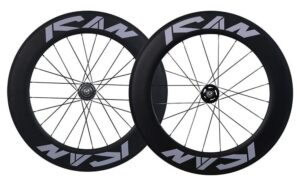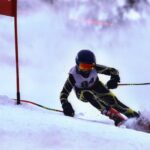 Yes, Kristian Blummenfelt won the 2021 Ironman World Championships in St. George, Utah recently (I know, it’s 2022; how absurd is that!), a truly impressive performance given that this race was only his second Ironman-distance race ever. At the same time, I would argue that the biggest winner of the event was Lionel Sanders. Lionel is my favorite professional triathlete (as he is for most who follow our sport) because he is an interesting fellow with a transformative life story. He is also an open and unfiltered person who speaks his mind with little regard to what others think of him (I’ve watched just about every one of Lionel’s YouTube videos, but I’ve never met him).
Yes, Kristian Blummenfelt won the 2021 Ironman World Championships in St. George, Utah recently (I know, it’s 2022; how absurd is that!), a truly impressive performance given that this race was only his second Ironman-distance race ever. At the same time, I would argue that the biggest winner of the event was Lionel Sanders. Lionel is my favorite professional triathlete (as he is for most who follow our sport) because he is an interesting fellow with a transformative life story. He is also an open and unfiltered person who speaks his mind with little regard to what others think of him (I’ve watched just about every one of Lionel’s YouTube videos, but I’ve never met him).
Lionel has always had a tremendous capacity to suffer in his training and races (a truly remarkable quality to observe) and that ability to endure has, in some ways, served him well by enabling him to rise to near the pinnacle of our sport. At the same time, playing armchair shrink, I’ve also felt that much of his suffering was a form of self-medication against his internal demons and that it was ultimately self-sabotaging to his efforts to be the best long-distance triathlete in the world.
 But we have all seen a significant change in Lionel this year. He has, for the first time in his career, a dedicated triathlon coach (oddly, Mikal Iden is the brother of one of his biggest competitors, Gustav), is approaching his training more scientifically, and he is showing a trust in his training program that he never had before (Lionel said recently that, after he finished 2nd in the 2017 Ironman World Championships, he decided to change his entire training program for 2018; it turned out not to be a good idea!).
But we have all seen a significant change in Lionel this year. He has, for the first time in his career, a dedicated triathlon coach (oddly, Mikal Iden is the brother of one of his biggest competitors, Gustav), is approaching his training more scientifically, and he is showing a trust in his training program that he never had before (Lionel said recently that, after he finished 2nd in the 2017 Ironman World Championships, he decided to change his entire training program for 2018; it turned out not to be a good idea!).
In reflecting on Lionel’s come-from-behind 2nd place finish in St. George, there are four factors that I observed that are new to him and that served him very well: preparation, plan, discipline, and execution. Lionel’s use of these four elements offer important lessons for every triathlete who wants to go faster and farther.
Preparation
I have written extensively about the importance of preparation because it is the foundation of all success. The demands of Ironman racing are significant physically and mentally. And triathlon isn’t a sport that can be faked. You can only do what you’ve trained your body to do.
are significant physically and mentally. And triathlon isn’t a sport that can be faked. You can only do what you’ve trained your body to do.
Lionel has said that he never felt more prepared to race than he did at St. George. Why? Because, perhaps for the first time in his career, he followed a training program that was comprehensive, integrated, structured, consistent, periodized, and personalized (attributes that are fundamental to an effective training program). His training program was guided by the latest sport science and ongoing performance data rather than by how Lionel felt (the metric that guided his training for most of his career).
Lesson #1: When you arrive at the swim start, be able to say, “I’m as prepared as I can be.”
Plan
As the saying goes, “A man without a plan is a man who can get easily lost” (actually I just made that up). Lionel had a race plan that was designed for him to have the best race he was physically capable of having. It was based on his preparations leading up to the race. He knew exactly what he needed to do in terms of strategy, pace, nutrition, and hydration. This clarity of his race plan enabled him to stay laser focused on what he needed to do without expending a lot of mental energy on challenges and decisions that inevitably arise during the course of an Ironman.
 Though I don’t know for sure, I would also guess that he and his coach developed a Plan B in case Plan A wasn’t working.
Though I don’t know for sure, I would also guess that he and his coach developed a Plan B in case Plan A wasn’t working.
Lesson #2: Create a race plan that you believe will lead you to your race goals (and also have back-up plan because triathlons rarely go completed as planned).
Discipline
This is where Lionel truly excelled, perhaps for the first time in his career. Instead of responding emotionally to how the race unfolded, he had the discipline to trust that his plan would take him where he wanted to go. And, if you watched the race, you saw that Lionel was faced with several inflection points, on the bike and the run, where, in the past, he might have discarded his plan and powered forward, only to blow up before the finish. For example, early in the bike segment, Cam Wurf and Sam Long went charging ahead to catch the lead pack that came out of the water first. At that moment, Lionel could have felt compelled to take up the chase as well because he is a strong cyclist, is a competitive guy, might have seen the value of having a pace line, and just didn’t want to fall farther behind. But he maintained his discipline and stayed with his race plan. Lionel said after that, at that point, he accepted that the race would be one very long time trial.
had the discipline to trust that his plan would take him where he wanted to go. And, if you watched the race, you saw that Lionel was faced with several inflection points, on the bike and the run, where, in the past, he might have discarded his plan and powered forward, only to blow up before the finish. For example, early in the bike segment, Cam Wurf and Sam Long went charging ahead to catch the lead pack that came out of the water first. At that moment, Lionel could have felt compelled to take up the chase as well because he is a strong cyclist, is a competitive guy, might have seen the value of having a pace line, and just didn’t want to fall farther behind. But he maintained his discipline and stayed with his race plan. Lionel said after that, at that point, he accepted that the race would be one very long time trial.
Lesson #3: Don’t let race dynamics undermine your discipline in sticking with the plan that you believe in.
Execution
From watching the race and listening to Lionel’s post-race remarks, it appears that he executed his race to near perfection. He was optimally prepared, had a plan that he had confidence in, stayed disciplined in the face of many temptations to throw caution to the wind, and the result was a remarkable race that lead him through the pack of pros, catching and passing Braden Currie with less than a quarter mile to go, and resulting is an admirable 2nd place in the Ironman World Championships.
prepared, had a plan that he had confidence in, stayed disciplined in the face of many temptations to throw caution to the wind, and the result was a remarkable race that lead him through the pack of pros, catching and passing Braden Currie with less than a quarter mile to go, and resulting is an admirable 2nd place in the Ironman World Championships.
Lesson #4: As a general rule, if you execute your plan, you are very likely to achieve the goal you set for yourself.
Bonus Key: Satisfaction
For the first time in a long time (maybe forever), Lionel seemed to be truly satisfied with his performance in St. George. In the past, he had a tendency to focus on what didn’t go well. But, in evaluating this race, he was almost entirely positive about his performance (his only negative was his comment that he is tired of finishing 2nd). He believed that he did everything he could to have a great race and it resulted in an outstanding result. In listening to Lionel reflect on his performance, I got a clear sense of the fulfillment and pride he felt in his effort.
Lesson #5: If you give your best effort, give yourself a pat on the back, a “well done!,” and allow yourself to feel good about your performance.





